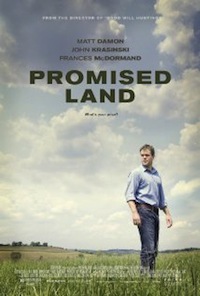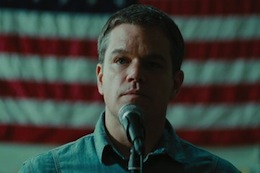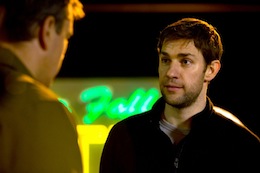 Promised Land, the latest film from Gus Van Sant is a social problem film for the 21st century. The film, which was written by stars Matt Damon and John Krasinski, takes on the hot-button environmental issue of fracking. Damon plays Steve Butler, a good-intentioned employee of a major energy company. He, along with his partner Sue Thomason (played by Frances McDormand), are charged with approaching farmers and various land owners in an economically suffering small town in Ohio and securing land leases in order to drill for natural gas.
Promised Land, the latest film from Gus Van Sant is a social problem film for the 21st century. The film, which was written by stars Matt Damon and John Krasinski, takes on the hot-button environmental issue of fracking. Damon plays Steve Butler, a good-intentioned employee of a major energy company. He, along with his partner Sue Thomason (played by Frances McDormand), are charged with approaching farmers and various land owners in an economically suffering small town in Ohio and securing land leases in order to drill for natural gas.
After things go sideways during a pep rally where Butler inadvertently insults the principal and underestimates the small town’s resistance to what he thinks is a win-win situation, the town’s decision to allow fracking is left up to a vote. Complicating things further, is an environmentalist (Krasinski) who shows up to try the sway the vote away from fracking through a grassroots campaign and some good-natured antagonism against Big Energy.
The social problem genre is a slippery one. The films are preachy by nature and their messages are often overt and direct, usually taking a single position and filtering the events of a film through that position. That’s not to say that the films can’t be effective or emotionally investing, but when done wrong they’re insultingly simple, or alienating, speaking only to an audience who already agrees with or understands the issue. This creates an echo chamber, which, again, limits your audience and the message.
There are two surefire ways around this: The first is to make a film that focuses on the characters and their struggles in a realistic and relatable way. This takes the burden of the film off of the message and onto the performer – Think: Mr. Smith Goes To Washington or other Frank Capra films from the 1940s. The other way is to create a complex allegory, genre-bending in the process. The Day The Earth Stood Still or even Blade Runner would serve as examples of this. In either case, the problem or issue is tucked in the background, in favor of a fully-formed performance or narrative.
 To its detriment, Promised Land does the exact opposite, foregoing any of the subtlety or layering and leading with its message chin-first. Characters are thinly drawn and simple. There’s a small plot twist toward the end that provides the film’s only surprise, but as a story it proceeds along a relatively expected and predictable path. Even the town, which is supposed to be a stand-in for Anywhere, USA, is dull and lifeless, full of vague characters who are uninteresting – an especially interesting misstep from Van Sant, considering he usually prides himself on using non-actors to create a sense of naturalism.
To its detriment, Promised Land does the exact opposite, foregoing any of the subtlety or layering and leading with its message chin-first. Characters are thinly drawn and simple. There’s a small plot twist toward the end that provides the film’s only surprise, but as a story it proceeds along a relatively expected and predictable path. Even the town, which is supposed to be a stand-in for Anywhere, USA, is dull and lifeless, full of vague characters who are uninteresting – an especially interesting misstep from Van Sant, considering he usually prides himself on using non-actors to create a sense of naturalism.
But there’s nothing natural about Promised Land. It’s a dull and uninspired commentary on fracking and Big Energy that doesn’t say much beyond, “Fracking is bad,” but never really explains why it’s bad or what makes it so attractive. It’s not an offensively bad film, but it’s not a particularly inspired one either.




Comments on this entry are closed.